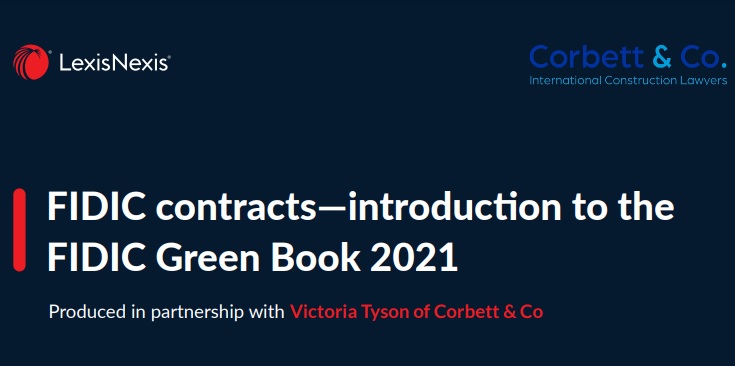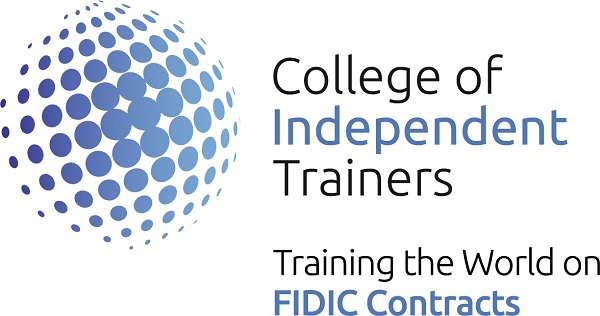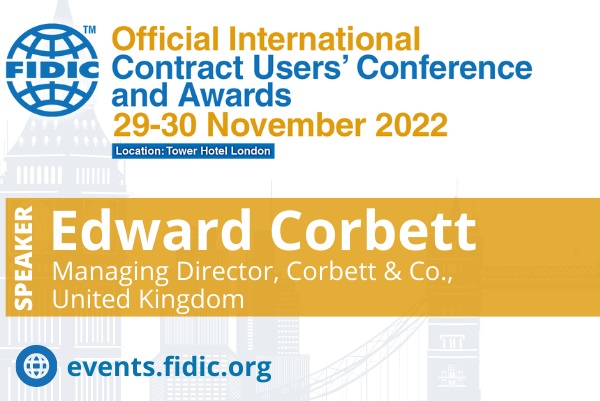Learn more about us:
Featured News
FIDIC 2022 Reprints: 10 Key Areas Of Change In The FIDIC Red Book 2017
FIDIC ‘launched’ the FIDIC 2022 reprints at the FIDIC International Construction Users’ Conference 2022, in London. The reception to the changes was mixed – some embraced the clarity; others questioned the significance and cost. This article draws your attention to 10 of the key areas of change in respect of the FIDIC Red Book 2017 including the definition of Claim, matters to be agreed or determined, the definition of Dispute and Exceptional Events.
Corbett & Co. Counsel, Taner Dedezade spoke at the FIDIC International Contract Users’ Conference Forum & Workshop
Corbett & Co. Counsel, Taner Dedezade was a speaker in a forum on dispute avoidance and adjudication forum as well as running a FIDIC Claims Workshop at at The Official FIDIC International Contract Users’ Conference.
Edward Corbett spoke at the FIDIC Contract Users’ Conference in London 29 – 30 November.
Edward Corbett was part of a panel discussing how Covid-19, war and rising inflation have had an impact on the construction industry and how companies have navigated through economic uncertainty and rising inflation.
Worldwide

Experience includes:
- Road projects in Poland, Romania, Gibraltar, Albania, Iceland, Macedonia
- Rail projects in Romania, Bulgaria
- Building projects in Romania, Gibraltar, Ukraine
- Waste and water projects in Bulgaria, Croatia, Turkey, Romania
- Dredging works in Romania, Albania, the Baltic, Southern Europe
- Energy and power projects in UK, Holland, Gibraltar, Iceland, Serbia, Georgia
- Airport in Gibraltar
- Mine project in Spain
- Consultant Agreement in Georgia
England Focus
Experience includes litigation, arbitration and ADR on:
- Residential and commercial property claims
- Energy projects
- Mechanical and electrical claims
- Final Accounts and delay claims
- Advising on professional appointments
- Advising on contamination of land issues
- Drafting of construction contracts
Jurisdiction, Admissibility and FIDIC
An issue that often arises in international arbitrations involving the FIDIC forms of contract is whether a claimant's failure to: (a) go through the dispute resolution provisions; or (b) comply with a time-bar clause gives rise to a question of admissibility or jurisdiction. Put another way, if a claimant has failed to issue a notice of claim within 28 days or failed to refer a dispute to a DAB, does the arbitral tribunal have jurisdiction to make an award on the merits or should the arbitral tribunal make an award stating that it lacks jurisdiction?
Tribunal Secretaries: Tasks, Transparency and Regulation
Background The debate surrounding the use of tribunal secretaries in international arbitration is not new. In 2002, Partasides christened the issue "the Fourth Arbitrator"[1]. Noting concern within the arbitration community at a perceived excessive role

Experience includes:
- Advising on consultant’s contract in Trinidad
- Advising on contract conditions in St Maarten
- Port project in Trinidad
- Energy projects in Chile & Peru
- Pier project in the Caribbean
The Employer’s Agent
The Engineer is deemed to act for the Employer and is essentially the Employer’s agent under the FIDIC Red Book 1999. He is not a wholly impartial intermediary, unless such a role is specified in the Particular Conditions, and there is no general obligation under the FIDIC Red Book 1999 for the Engineer to act independently or impartially. However, when he is required to make a determination under Sub-Clause 3.5, he is obliged to make it a fair determination and when he is obliged to issue an Interim Payment Certificate under Sub-Clause 14.6, or a Final Payment Certificate under Sub-Clause 14.13, he must fairly determine the amount due.
Murphy’s Law
Earlier this year, the English High Court considered a heavily amended FIDIC Yellow Book 1999. Whilst the case is specific to the particular contractual amendments it is worth review. The case is J Murphy & Sons Ltd v Beckton Energy Ltd. It proceeded in court and on an expedited basis as a matter of some urgency because a bond was about to be called for non-payment of delay damages. The Contractor claimed the call would affect his commercial reputation, standing and creditworthiness, and may well need to be disclosed in future tenders. He had not paid the delay damages because there had been no agreement or determination of the entitlement to such by the Engineer under Sub-Clauses 2.5 and 3.5.

Experience includes:
- Road projects in Ethiopia, Malawi, Kampala, Uganda
- Building projects in Libya, Egypt, Sudan
- Energy and power projects in Uganda, Tunisia, Kenya, Sudan, Tanzania, Egypt, Ethiopia, Rwanda
- Airport projects in Ethiopia
- Heavy industrial projects in Egypt, West Africa, Uganda
- Advising on the call of bonds in Uganda, Rwanda
- Advising on bonds/guarantee conditions in Zambia, Rwanda
- Advising on contract conditions in Niger, Armenia, Rwanda
- Negotiating contract terms on a windfarm in Kenya
- Port project in Togo
- Water project in Malawi
- ICC arbitration against a contractor in relation to the construction of elements of a port in Morocco
Arbitration Update 2021
The last year or two has seen changes in arbitration rules and procedures, caused in no small part by the COVID-19 pandemic. There are new LCIA, DIFC-LCIA and ICC arbitration rules. The Seoul Protocol on Video Conferencing in International Arbitration is being regularly used and the Africa Arbitration Academy Protocol on Virtual Hearings has been issued. There have also been revisions to the IBA Rules on Taking Evidence in International Arbitration. This short update looks at the key take-aways from these changes.
Frozen Out
What relief does FIDIC provide when bank accounts are frozen as a result of war, hostilities, rebellion, terrorism etc.? Maybe not as much as you think. Tensions in Africa and the Middle East have seen the implementation of numerous international financial sanctions. While these sanction regimes vary in execution and enforcement they often freeze assets and prevent financial transactions. These restrictions may impact on the Employer’s performance of its payment obligations under the Contract. This can have serious consequences where the Contractor is entitled to suspend or terminate on notice for non-payment. Many parties automatically assume that financial sanctions will be recognised as force majeure. However, this may not be the case.
Where Do FIDIC Cases Go?
FIDIC is arguably the most widely used standard form of international construction contract but reported FIDIC cases are rare. Is it time for an increased publication of FIDIC cases? There are three categories of decisions arising out of FIDIC dispute resolution provisions: 1. Decisions of the Engineer or the Dispute Adjudication Board (DAB), which will generally not be published or reported to anyone other than the parties involved in the dispute. 2. Decisions of arbitral tribunals, which are not usually made public although this is subject to certain exceptions. 3. Decisions of national courts, which are a relatively rare occurrence for the reasons discussed below.

Experience includes:
- Road projects in Vietnam, India, Kyrgyzstan, Malaysia, Ukraine
- Rail projects in Vietnam
- Bridge construction in Vietnam
- Energy and power projects in Laos, Borneo, Indonesia
- Building projects in Hong Kong, the Seychelles, Malaysia
- Port projects in India
- Dredging works in Australia, Bangladesh
- Advising on a bond in India
- Advising on contract conditions in Australia
- Advising on disputes regarding waste water treatment plant in Uzbekistan
- Hydropower Projects in Pakistan, Nepal
- Airport project in Nepal
- Water tunnel project in Nepal
Middle East Focus
- Energy projects in Abu Dhabi, Saudi Arabia
- Port projects in Iraq
- Rail project in Abu Dhabi
- Heavy industrial projects in Qatar, Jordan
- Building projects in Lebanon
- Advising on construction of a sea wall in Oman
- Advising on a final account claim in Iran
- Waterpark project in Abu Dhabi
- Commercial building projects in Abu Dhabi
FIDIC Changes in Legislation and Covid-19: Compelled by Law or Just Doing Your Job?
Up until the spring of 2020, a FIDIC 1999 Sub-Clause 13.7 [Adjustments for Changes in Legislation][1] claim was just one of many issues to be resolved, for example, in a delay and disruption claim or a Cost claim. However, the focus it receives in the context of Covid-19 is drastically different. Many in the industry are using the changes in legislation provision to seek financial compensation in a situation that would otherwise potentially only attract an extension of time.[2] Awarding Cost for Covid-19 events regardless of the circumstances may seem to some (Contractors mostly, though there are Employers and Engineers who agree) like the appropriate thing to do, but whether it is correct according to the Contract is a different question.
Arbitration Update 2021
The last year or two has seen changes in arbitration rules and procedures, caused in no small part by the COVID-19 pandemic. There are new LCIA, DIFC-LCIA and ICC arbitration rules. The Seoul Protocol on Video Conferencing in International Arbitration is being regularly used and the Africa Arbitration Academy Protocol on Virtual Hearings has been issued. There have also been revisions to the IBA Rules on Taking Evidence in International Arbitration. This short update looks at the key take-aways from these changes.
Changing Tack
A contract may require a party giving notice of a claim to specify the contractual or legal basis of that claim in the notice (or the supporting particulars). What if that party states a contractual or legal basis for the claim but later (perhaps with the benefit of additional information or because of advice from its lawyers) changes its mind or wants to include further contractual or legal bases? This was considered by the Hong Kong Court of Appeal in Maeda Corporation and China State Construction Engineering (Hong Kong) Limited v Bauer Hong Kong Limited [2020] HKCA 830. It found that a subcontractor could not change the contractual basis for its claim once the time period for providing such notice had expired. What, if any, impact will this decision have on the FIDIC forms of contract?

Experience includes:
- Road projects in Poland, Romania, Gibraltar, Albania, Iceland, Macedonia
- Rail projects in Romania, Bulgaria
- Building projects in Romania, Gibraltar, Ukraine
- Waste and water projects in Bulgaria, Croatia, Turkey, Romania
- Dredging works in Romania, Albania, the Baltic, Southern Europe
- Energy and power projects in UK, Holland, Gibraltar, Iceland, Serbia, Georgia
- Airport in Gibraltar
- Mine project in Spain
- Consultant Agreement in Georgia
England Focus
Experience includes litigation, arbitration and ADR on:
- Residential and commercial property claims
- Energy projects
- Mechanical and electrical claims
- Final Accounts and delay claims
- Advising on professional appointments
- Advising on contamination of land issues
- Drafting of construction contracts

Experience includes:
- Advising on consultant’s contract in Trinidad
- Advising on contract conditions in St Maarten
- Port project in Trinidad
- Energy projects in Chile & Peru
- Pier project in the Caribbean

Experience includes:
- Road projects in Ethiopia, Malawi, Kampala, Uganda
- Building projects in Libya, Egypt, Sudan
- Energy and power projects in Uganda, Tunisia, Kenya, Sudan, Tanzania, Egypt, Ethiopia, Rwanda
- Airport projects in Ethiopia
- Heavy industrial projects in Egypt, West Africa, Uganda
- Advising on the call of bonds in Uganda, Rwanda
- Advising on bonds/guarantee conditions in Zambia, Rwanda
- Advising on contract conditions in Niger, Armenia, Rwanda
- Negotiating contract terms on a windfarm in Kenya
- Port project in Togo
- Water project in Malawi
- ICC arbitration against a contractor in relation to the construction of elements of a port in Morocco

Experience includes:
- Road projects in Vietnam, India, Kyrgyzstan, Malaysia, Ukraine
- Rail projects in Vietnam
- Bridge construction in Vietnam
- Energy and power projects in Laos, Borneo, Indonesia
- Building projects in Hong Kong, the Seychelles, Malaysia
- Port projects in India
- Dredging works in Australia, Bangladesh
- Advising on a bond in India
- Advising on contract conditions in Australia
- Advising on disputes regarding waste water treatment plant in Uzbekistan
- Hydropower Projects in Pakistan, Nepal
- Airport project in Nepal
- Water tunnel project in Nepal
Middle East Focus
- Energy projects in Abu Dhabi, Saudi Arabia
- Port projects in Iraq
- Rail project in Abu Dhabi
- Heavy industrial projects in Qatar, Jordan
- Building projects in Lebanon
- Advising on construction of a sea wall in Oman
- Advising on a final account claim in Iran
- Waterpark project in Abu Dhabi
- Commercial building projects in Abu Dhabi
Meet the team
Insights
FIDIC 2022 Reprints: 10 Key Areas Of Change In The FIDIC Red Book 2017
FIDIC ‘launched’ the FIDIC 2022 reprints at the FIDIC International Construction Users’ Conference 2022, in London. The reception to the changes was mixed – some embraced the clarity; others questioned the significance and cost. This article draws your attention to 10 of the key areas of change in respect of the FIDIC Red Book 2017 including the definition of Claim, matters to be agreed or determined, the definition of Dispute and Exceptional Events.
FIDIC contracts—introduction to the FIDIC Green Book 2021
This Practice Note is an introduction to the FIDIC Green Book 2021 (the Short Form of Contract). It is not a fully detailed clause-by-clause commentary. This article was first published by LexisPSL
The 12 Worst Things About FIDIC 2017 – A Christmas Special
The FIDIC 2017 forms first appeared at the December FIDIC Users’ Conference four years ago. No one has suggested that the FIDIC 2017 forms of contract did not rectify some of the problems in the FIDIC 1999 forms, and in Edward Corbett’s articles,[1] ‘Cherry Picking FIDIC 2017,’ and ‘FIDIC 2017 – First Impressions of the 3-Kilo Suite’, he considered some of these changes. This new suite of contracts had, at best, a lukewarm reception when they were first reviewed, with some commentators complaining about the length of these new contracts and that the contracts had not taken account of criticisms that had been made by reviewers. This article looks at the twelve worst ‘gifts’ that FIDIC gave to us for Christmas 2017.
Edward Corbett is the Principal of the new College of Independent Trainers (CIT)
The College of Independent Trainers has been launched and FIDIC training organisations and individual trainers at CIFT are already offering a variety of public and in-house courses for 2023 in person or online.
Edward Corbett spoke at the FIDIC Contract Users’ Conference in London 29 – 30 November.
Edward Corbett was part of a panel discussing how Covid-19, war and rising inflation have had an impact on the construction industry and how companies have navigated through economic uncertainty and rising inflation.
Corbett & Co. Director Joanne Clarke to present MBL Webinar on International Construction & Engineering Disputes – Dispute Resolution Clauses & Boards
Corbett & Co. Director Joanne Clarke is presenting an MBL Webinar on International Construction & Engineering Disputes - Dispute Resolution Clauses & Boards. The webinar will be streamed at 12:30pm on Friday 9 December 2022
Escalating construction costs under FIDIC: is Sub-Clause 13.8 an answer?
Construction costs are escalating. Under existing contracts, an employer will not want to pay more for the works. But forcing a contractor to perform works that are unprofitable or causing a massive loss is unlikely to be in the best interests of the project. It may result in the insolvency of the contractor forcing the employer to abandon the contract or re-let it, probably at a premium. Is a mechanism for cost adjustment, such as FIDIC 1999 Sub-Clause 13.8 [Adjustments for Changes in Costs], an answer?
Price escalation and FIDIC: is Force Majeure an answer?
Could provisions in FIDIC contracts giving relief for ‘Force Majeure’ or ‘Exceptional Events’ provide relief to contractors suffering as a result of price escalation? It is well documented that construction and engineering projects around the globe are being affected by extreme and sometimes unprecedented price escalation. This is for many reasons including the Covid-19 pandemic and the Russo-Ukrainian conflict.











